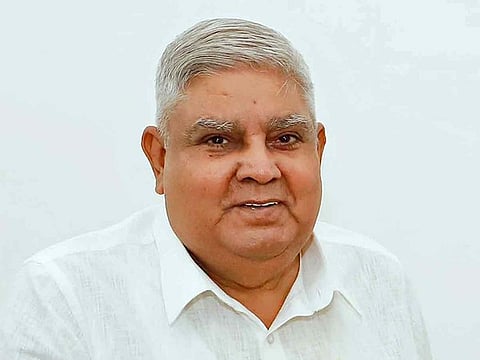Jagdeep Dhankhar: The man who would be India’s next Vice-President
Those who have followed his rise in politics know that it is impossible to dislike him

West Bengal Governor Jagdeep Dhankhar has been announced as the ruling National Democratic Alliance’s candidate for India’s Vice-Presidentship. For those who are unsure why — if not who — when it comes to his candidature, Prime Minister Narendra Modi’s moniker for him, “kisan putra,” offers a clue.
Kisan Putra means farmer’s son. According to the National Statistical Office’s report of 2018-19, there are over 93 million “agricultural households” in India. If each household has five members on an average, close to half-a-billion people depend on agriculture in the country.
This is a huge number. But given the extent of under or unemployment in mostly rural farming households, many of them relying on the government’s grain subsidies for survival, some experts estimate the actual number of people directly engaged in agriculture might be much less, even as low as 45-50 million.
Though the data on the actual number of farmers may not be reliable, what is absolutely certain is that they constitute a powerful force in Indian politics. This was borne out in the recent farmer’s agitation, which went on for a year, forcing the government to revoke its farm laws.
The farm lobby, made up of well-off politically aware and empowered farmers, is especially strong in states such as Punjab, Haryana, parts of Western Uttar Pradesh, and North-Eastern Rajasthan. As it happens, this area is also known as India’s “Jat belt.”
The Jats are a sturdy people, politically dominant, and difficult to cow down. They fought both the Mughals and the British, until the latter, dubbing them a “martial race,” particularly among Sikh and Muslim Jats, recruited them in large numbers in the Indian army.
For the BJP, a Vice-President from this community, which has never been represented at such a high office of such honour as the second citizen of the country, is an astute political move. Dhankhar represents much more than the well-off farmers or the community that he comes from.
He is also, as it happens, from Rajasthan, a state still ruled by the Congress, where he was one of the top lawyers before he entered politics full-time. Indeed, his legal skill, knowledge of the Constitution, and ability to get along with politicians of all shades and stripes adds to his already impressive qualifications.
The latter begin with degrees in Physics and Law, after passing out of Sainik School, Chittorgarh. Before his gubernatorial stint in West Bengal, Dhankhar was elected MP from the Jhunjhunu seat in Rajasthan on the Janata Party ticket in 1989, served as Minister of State for Parliamentary Affairs in the Central Government in 1990, and then became Member of the Rajasthan Assembly in 1993.
But those who know Dhankhar, or have followed his rise in national politics, will swear that one of his greatest qualities is that it is impossible to dislike him. I had a very brief and altogether pleasant encounter with him during the ABP Ideas of India Summit in Mumbai in March this year.
Dhankhar was in a panel with Congress MP and author, Shashi Tharoor. It was a lovely conversation, full of good humour and banter, but not devoid of tough talk. Especially on Dhankhar’s somewhat controversial role as a hands-on, if not interventionist, Governor in a state ruled by the feisty Mamata Banerjee, chairperson of the All India Trinamool Congress (TMC) and state CM.
At the end of the session, the audience was overwhelmingly convinced that Governor Dhankhar was a “people’s governor,” more sinned against than sinning, subject to diatribes, fake accusations, and harassment by both TMC leaders and cadres. What is more, he answered every question with tactful enthusiasm.
While moving out, flanked by his black cat commandos, he made time for some of us, who were also participants, waiting in the green room for the next session. I found him extremely humble and affable, treating strangers as if they were friends, which is one unmistakable quality of a seasoned public figure.
Although current Vice-President M. Venkaiah Naidu’s hugely successful stint will be a tough act to follow, I am sure Dhankhar will make a popular and successful Vice-President. Especially when it comes to handling the business of the Upper House of Parliament or Rajya Sabha, which he will preside over.
But having worked with V.P. Singh, Devi Lal, and others whose successors form part of the present opposition before joining the BJP in 2008, he will ensure that there will be no unified opposition against him. He also enjoys the trust of the Rashtriya Swayamsevak Sangh (RSS) for defending Sangh seniors like Indresh Kumar.
For the first time in the seventy-five years of independent India, both the speaker in the Lok Sabha (Upper House), Om Birla, and Rajya Sabha, will be from the state of Rajasthan. Dhankhar will also add to and offset the President-to-be, Draupadi Murmu, who comes from a much more underserved and marginalised tribal background. Of course, there might be further calculations which may emerge with time.
In the meanwhile, the opposition has fielded 80-year-old former Congress cabinet minister and Rajya Sabha member, Margaret Alva, as their candidate. Once part of Congress President Sonia Gandhi’s inner coterie, Alva fell out of favour, spending several years in political wilderness.
Other than fronting a woman candidate, who is also a Christian, what her comeback to the centre stage of Indian politics means, even as a losing contender, remains to be seen. The numbers already favour the BJP-led NDA candidate, Dhankhar. They may swell further as we approach Aug. 6, the day of the VP election.
Sign up for the Daily Briefing
Get the latest news and updates straight to your inbox








